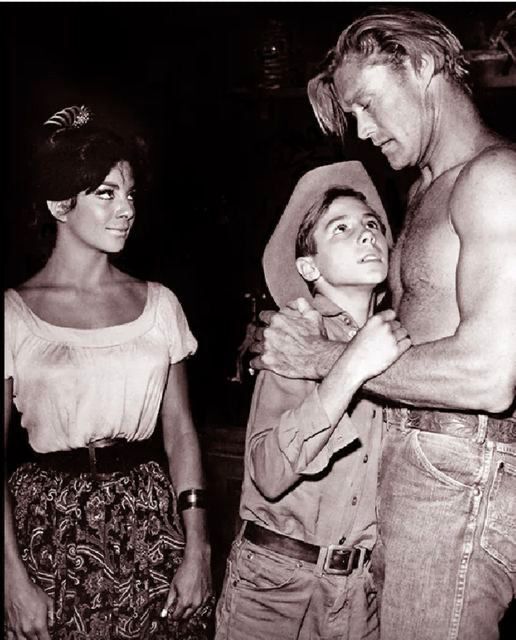More than six decades after its debut, The Rifleman continues to hold a special place in the hearts of television fans. The show first aired in 1958, starring Chuck Connors as rancher Lucas McCain and Johnny Crawford as his young son Mark. At first glance, it seemed like another Western, a genre that dominated television during the 1950s and 1960s. But what made The Rifleman unique—and what has kept it beloved for generations—was the heart at the center of the story: the powerful, sometimes tender, often complicated relationship between a father and his son.
Lucas McCain was not just another gunslinger. He was a widowed father raising his boy in the rough New Mexico territory of the 1880s. The gunfights and showdowns were important, yes, but they were often the backdrop for something deeper. At its core, The Rifleman was about respect, morality, and strength—not just the kind you needed to pull a trigger, but the kind you needed to guide a child through a hard world. Each episode carried a lesson, whether about honesty, loyalty, or courage. Lucas wasn’t perfect, and that made him relatable. He had his struggles and his doubts, but through it all, he tried to raise Mark into a decent, kind, and brave man.
In many ways, the show redefined what a Western could be. The genre often leaned on action and justice meted out by gunfire, but The Rifleman layered that with warmth and heart. Families watching together saw a widowed father trying his best, and a boy who adored his dad while learning to stand on his own two feet. Their relationship gave the show an emotional anchor, which was rare for television at the time.
Of course, like many productions of its era, the show wasn’t without mistakes and quirks. One of the more amusing bloopers fans still talk about is Lucas McCain’s wardrobe. In several episodes, he wears Wrangler jeans, even though the brand didn’t exist in the 1880s setting. This kind of anachronism wasn’t unusual in mid-century television. Studios often used what was available, and audiences back then weren’t as quick to point out historical inaccuracies as modern fans armed with pause buttons and high-definition replays. While details like jeans might stand out today, they never took away from the emotional resonance of the story.
The show also had some fascinating behind-the-scenes touches. For instance, Chuck Connors’ real-life son, Jeff Connors, made a cameo appearance in one episode. It was a small moment, but knowing that a real father and son briefly shared the screen in a series defined by that very bond added an extra layer of authenticity. Fans who later learned this detail often said it made those episodes even more special, as if life itself had spilled onto the set.
The iconic Winchester rifle used by Lucas became as famous as the character himself. Modified with a rapid-fire lever action, the rifle gave Lucas his edge in gunfights, allowing him to fire with incredible speed. But what many viewers may not know is that this very rifle had a history in Hollywood before The Rifleman. It was previously used by none other than John Wayne, the king of Westerns, linking the series to a larger cinematic heritage. That weapon became more than a prop—it became a symbol, part of the lore of Western storytelling.
Guest stars also added richness to the series. Over its run, The Rifleman featured appearances from entertainers and athletes who might not have been obvious choices for a gritty Western. Baseball legend Duke Snider, for instance, made a cameo, as did entertainer Sammy Davis Jr., whose role challenged racial stereotypes of the time by presenting him as an equal rather than a caricature. These appearances gave the series both cultural relevance and a sense of fun, showing that it wasn’t afraid to expand beyond the narrow lines of traditional casting.
Part of what has kept the show alive is the way it combined action with meaning. Every week, viewers got a dose of thrilling frontier justice—bandits, cattle rustlers, rival ranchers—but beneath it all was a reminder that love and character mattered more than violence. Lucas didn’t just want to win shootouts; he wanted to raise a son who understood right from wrong, even when the choices weren’t easy. Mark’s youthful innocence often reminded Lucas—and the audience—that sometimes the hardest battles weren’t fought with guns but with integrity.
It’s worth remembering that when The Rifleman aired, America itself was changing. The 1950s and 1960s were decades of shifting values, with families caught between tradition and a rapidly modernizing world. By showing a father who struggled, who sometimes faltered, but who always tried to put family and morality first, the series resonated deeply. It reassured audiences that even in tough times, doing the right thing mattered most.
Today, the series remains a touchstone for fans of classic television. Reruns continue to attract viewers, and DVDs and streaming platforms have brought it to a new generation. Younger audiences, even those raised far from Westerns, find something compelling in the universal themes: the bond between parent and child, the importance of values, the courage to face challenges.
Critics sometimes point to the show’s occasional inconsistencies or production flaws, but what endures isn’t perfection—it’s the feeling. Fans remember how Lucas looked at Mark with pride, or how Mark’s unwavering faith in his father softened even the hardest of episodes. They remember the lessons tucked between gunfights, the reminder that family and honesty could still prevail in a world full of hardship.
Over sixty years later, The Rifleman remains a cultural relic not because of its gun battles, but because it dared to place love, morality, and character at the center of the Western genre. Its small bloopers and production quirks only add to its charm, reminders that even legends are imperfect. In the end, it wasn’t about whether Lucas wore the right jeans or whether the rifle had been used in another film—it was about the values the McCains stood for.
The show remains a testament to the strength of storytelling that reaches beyond time and genre. More than a Western, more than a television drama, The Rifleman is a reminder that what truly makes us strong are not our weapons or our victories, but the bonds of family, the lessons we pass down, and the quiet courage to do the right thing.




